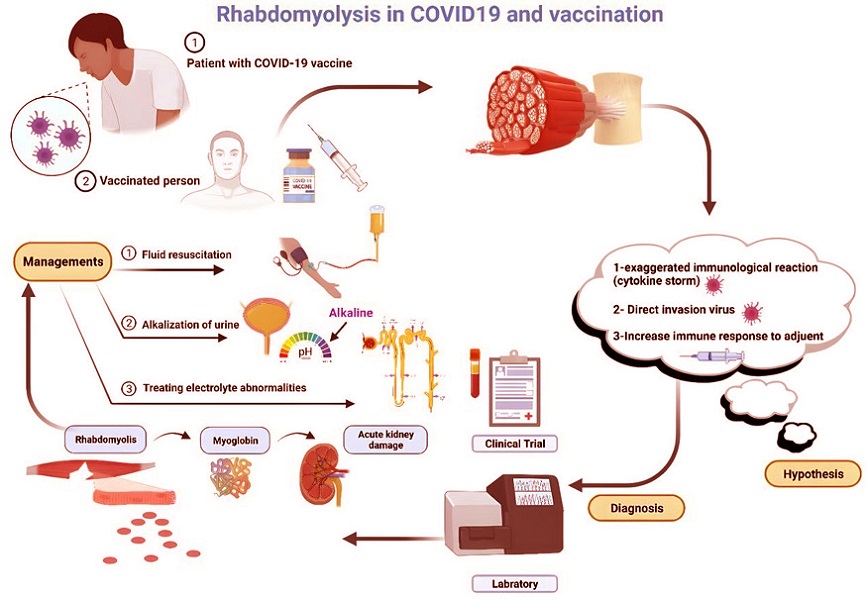Nikhil Prasad Fact checked by:Thailand Medical News Team Nov 21, 2024 1 year, 3 months, 1 week, 4 days, 4 minutes ago
Medical News: Rhabdomyolysis (RML) has emerged as a potential complication linked to both COVID-19 infections and COVID-19 vaccines, according to a comprehensive review of available literature. Researchers from institutions such as the Bogomolets National Medical University in Ukraine, Shahid Sadoughi University of Medical Sciences in Iran, and Cleveland Clinic in the United States highlight this condition as a significant, albeit rare, concern.
 Rhabdomyolysis after vaccination for COVID-19
What Is Rhabdomyolysis?
Rhabdomyolysis after vaccination for COVID-19
What Is Rhabdomyolysis?
RML is a medical condition characterized by the breakdown of muscle tissue, leading to the release of muscle fiber contents like creatine kinase (CK) and myoglobin into the bloodstream. This condition can cause serious complications, such as kidney damage or even failure. Symptoms typically include muscle pain, weakness, and dark-colored urine, but some cases may be asymptomatic.
COVID-19 and Rhabdomyolysis: A Troubling Link
COVID-19 infections have been found to trigger Rhabdomyolysis (RML) in some patients, often due to the virus's aggressive inflammatory response and potential direct invasion of muscle tissues. This
Medical News report examines how the condition manifests in COVID-19 patients. Severe cases of COVID-19, particularly those requiring intensive care, are more likely to develop RML.
A study of 1,079 ICU patients with COVID-19 found that individuals who experienced Rhabdomyolysis (RML) faced a significantly higher risk of mortality, especially if acute kidney injury (AKI) occurred concurrently. Early detection is crucial in such scenarios to prevent fatal complications.
COVID-19 Vaccines and Rhabdomyolysis: Rare but Serious
While vaccines are vital tools in combating the pandemic, rare cases of RML have been documented following COVID-19 vaccinations. The condition is most often associated with mRNA vaccines like those from Pfizer-BioNTech and Moderna.
Symptoms typically appear within 5 to 10 days after vaccination and include muscle pain and fatigue. In some cases, individuals required hospitalization for aggressive hydration therapy to mitigate kidney damage.
Researchers theorize that the immune response triggered by the vaccine, including T-cell activation and spike protein recognition, might play a role in the onset of RML. However, they emphasize that these cases remain exceedingly rare compared to the widespread benefits of vaccination.
Study Findings and Insights
The review analyzed multiple case reports and studies to identify trends and risk factors. Key findings include:
-Incidence Rates: Rhabdomyolysis following COVID-19 infections is relatively more common than cases related to vaccination.
-Risk Factors: Patients with pre-existing conditions such as hypertension, diabetes, or chronic kidney disease were at higher risk of develop
ing RML during or after COVID-19.
-Outcomes: The severity of RML often correlates with CK levels, and prompt treatment significantly improves survival rates.
For instance, a 67-year-old male who developed RML after contracting COVID-19 showed CK levels exceeding 400,000 IU/L and acute renal failure. However, after intensive hydration and dialysis, his condition stabilized.
Managing Rhabdomyolysis
Management of RML typically involves addressing the underlying cause and preventing complications. Key steps include:
-Hydration Therapy: Early and aggressive intravenous fluid administration helps flush out toxins and prevent kidney damage.
-Monitoring: Regular checks of CK levels, kidney function, and electrolyte balance are essential.
-Specialized Care: Severe cases may require dialysis to manage kidney failure or continuous renal replacement therapy for those in critical condition.
In cases linked to vaccination, patients should seek immediate medical attention if they experience persistent muscle pain or weakness after receiving the vaccine.
Conclusion
The review underscores the importance of awareness about Rhabdomyolysis as a complication of both COVID-19 and its vaccines. While rare, its potential severity warrants vigilance among healthcare providers and patients alike. The findings also highlight the need for further research to understand the mechanisms behind Rhabdomyolysis and develop better prevention and treatment strategies.
Early recognition and intervention are crucial to mitigating the risks associated with Rhabdomyolysis, especially in vulnerable populations. Although the occurrence of Rhabdomyolysis linked to vaccination is rare, its recognition is critical for ensuring patient safety while continuing to promote the benefits of immunization.
The study findings were published in the peer-reviewed journal: Frontiers in Medicine.
https://www.frontiersin.org/journals/medicine/articles/10.3389/fmed.2024.1460676/full
For the latest COVID-19 News, keep on logging to Thailand
Medical News.
Read Also:
https://www.thailandmedical.news/news/university-of-florida-researchers-warns-that-covid-19-infections-can-lead-to-rhabdomyolysis-with-extremely-elevated-creatine-kinase-levels
https://www.thailandmedical.news/news/breaking-news-scientists-discover-that-spike-protein-of-omicron-and-its-sub-lineages-binds-with-actin
